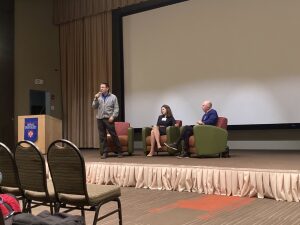For Matthew Carter, CEO of Depaul International, one term stuck with him, summing up how the International Journal on Homelessness conference builds a global community with the shared agenda of ending homelessness. “Father Memo [the former United Nations Vincentian Representative] talked about people referring to networking, but he thinks the sector is netweaving. We are one community weaving ourselves and our stories and perspectives together.”
This ‘netweaving’ was at the forefront of the conference, where people leading the charge tackling homelessness came together with peers from across the globe.
Held in Chicago, the conference was the first event of its kind. It was a joint venture between the International Journal on Homelessness and the Institute of Global Homelessness, a think tank developing a global strategy to end homelessness which was set up by Mark McGreevy, President of the Depaul Group.
Staff from across the Depaul subsidiary family, including UK, Ukraine and International teams, had the privilege of attending the conference. They were struck by the sense of community, with more than 20% of speakers having lived experience of homelessness. Matthew reflects that this led to richer discussions. “It was a more connected conversation, joining together the experiences of professionals in the sector, and those with that lived experience. It made it very powerful.”
Perspectives from those with lived experience were embedded right from the opening session. “[It] was a conversation between two people who were experts by their experience of homelessness. Jane from Canada had experienced homelessness as a young person, and Rob had experience of sleeping rough in the US,” recalls Alexia Murphy, Deputy CEO of Depaul UK. “Their conversation framed the three-day conference and put the lived experience of people who have been homeless at the centre of the conversation. In Rob’s words: “I don’t want to be invited to the table to prop it up, I want to be invited to the table to eat.”’
Depaul ran two sessions about our work in Ukraine, feeding into discussions experience of frontline services in the country. Olga Shevchenko, Programme Director of Depaul Ukraine, has been at the forefront of Depaul Ukraine’s work, and, alongside Matthew, ran a session entitled ‘Applying best practice and innovative solutions in an emergency.’
Olga presented a second session with Alexia, entitled ‘Crisis as a catalyst for change – comparing the experiences of Depaul UK and Depaul Ukraine in pandemic and war.’ Olga shared Depaul Ukraine’s experience of delivering and expanding their work in a time of war. “There were many correlations between the experiences of both organisations in a time of crisis,” reflects Alexia.
Tackling homelessness at a global level is central to Depaul’s mission, and learning from global colleagues is vital. Plenary sessions at the conference offered this opportunity, with speakers from India, the UK, Australia, the US, Canada and South Africa giving an insight into how historic policies in their countries have led to inequality in accessing homelessness services.
 At a closing keynote talk, Lydia Stazen, Director of the Institute of Global Homelessness, was joined in conversation by Jim Claffey, the current United Nations Vincentian Representative, and Father Memo. They reflected on the progress made to get homelessness recognised as part of the UN Sustainable Development Goals. This work is made possible by the joint work of Depaul, the Institute of Global Homelessness, and the Vincentian Family at the UN. “The goals are about ending poverty, which is so broad, and one key component to ending poverty is ending homelessness, which is massive” reflects Matthew. “It was really uplifting to see that we’ve come this far, and we’ve started to make big headway into the issue.”
At a closing keynote talk, Lydia Stazen, Director of the Institute of Global Homelessness, was joined in conversation by Jim Claffey, the current United Nations Vincentian Representative, and Father Memo. They reflected on the progress made to get homelessness recognised as part of the UN Sustainable Development Goals. This work is made possible by the joint work of Depaul, the Institute of Global Homelessness, and the Vincentian Family at the UN. “The goals are about ending poverty, which is so broad, and one key component to ending poverty is ending homelessness, which is massive” reflects Matthew. “It was really uplifting to see that we’ve come this far, and we’ve started to make big headway into the issue.”
Mark Robinson, Director of Operations at Depaul International, echoes this: “It was an inspiring way to finish, as it highlighted how Depaul and other organisations can feed into high level change.”
To make global change, awareness raising is needed. “We need to raise the importance of having a home. It is not just four walls… having a space where you can just be yourself is really important,” says Matthew. To do this, the first step is creating a strong, global voice which works to raise awareness about homelessness. “We want to work globally as a collective, as a coalition of voices,” he says.
For Matthew, this collective is a call to action to ‘do more.’ “There is a real opportunity here to make a difference by doing more, speaking up, and setting ourselves up in the direction we want to go in.” Netweaving perspectives and experiences together at the conference created a truly global community. With the shared agenda of ending global homelessness, there is hope that, together, the global community can realise this goal.